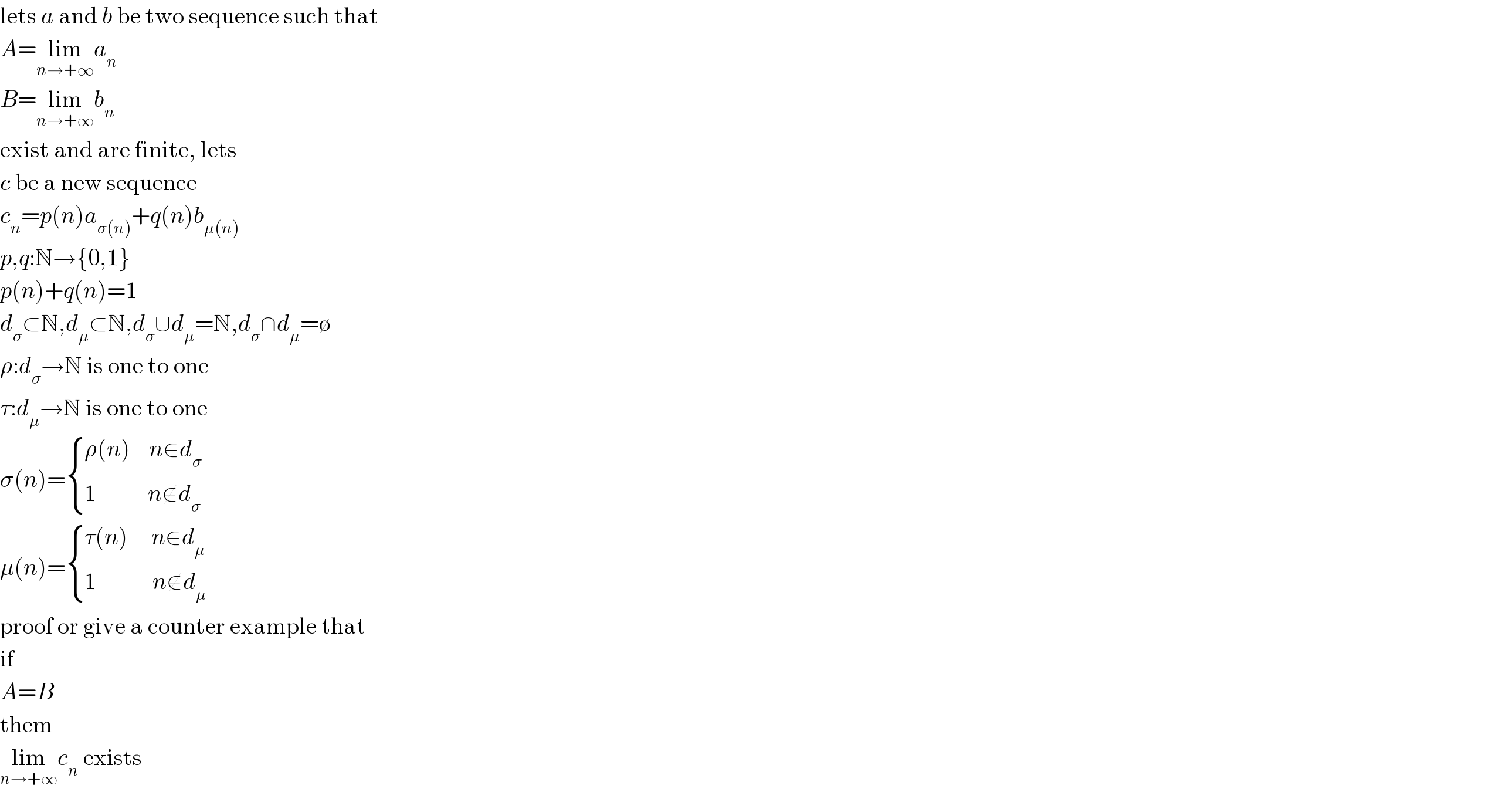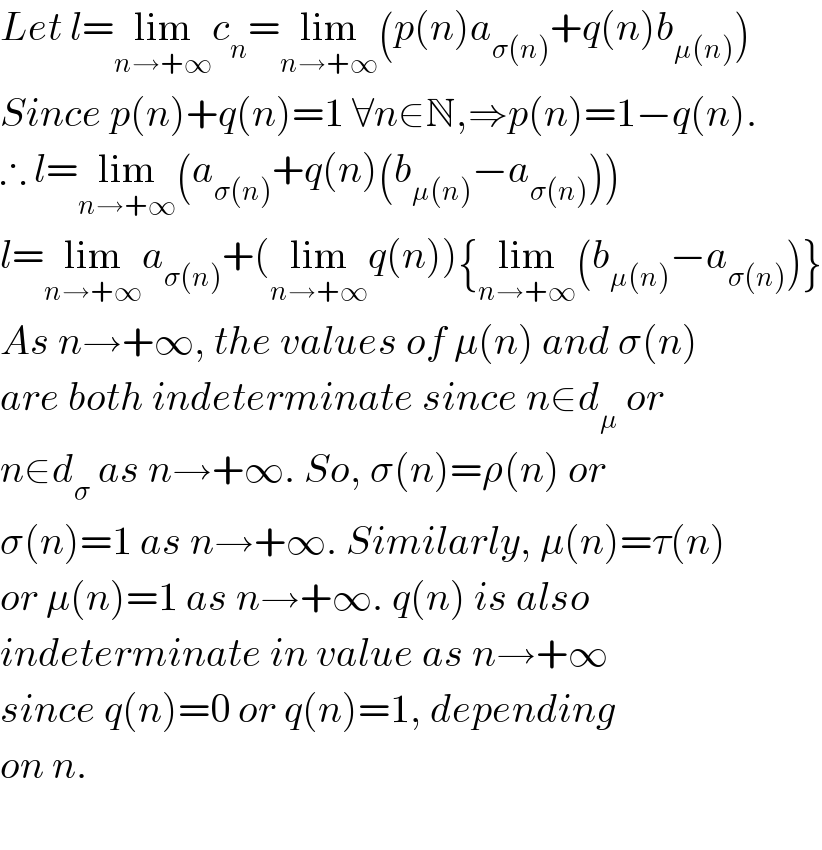
Question Number 4507 by 123456 last updated on 03/Feb/16

$$\mathrm{lets}\:{a}\:\mathrm{and}\:{b}\:\mathrm{be}\:\mathrm{two}\:\mathrm{sequence}\:\mathrm{such}\:\mathrm{that} \\ $$$${A}=\underset{{n}\rightarrow+\infty} {\mathrm{lim}}{a}_{{n}} \\ $$$${B}=\underset{{n}\rightarrow+\infty} {\mathrm{lim}}{b}_{{n}} \\ $$$$\mathrm{exist}\:\mathrm{and}\:\mathrm{are}\:\mathrm{finite},\:\mathrm{lets} \\ $$$${c}\:\mathrm{be}\:\mathrm{a}\:\mathrm{new}\:\mathrm{sequence} \\ $$$${c}_{{n}} ={p}\left({n}\right){a}_{\sigma\left({n}\right)} +{q}\left({n}\right){b}_{\mu\left({n}\right)} \\ $$$${p},{q}:\mathbb{N}\rightarrow\left\{\mathrm{0},\mathrm{1}\right\} \\ $$$${p}\left({n}\right)+{q}\left({n}\right)=\mathrm{1} \\ $$$${d}_{\sigma} \subset\mathbb{N},{d}_{\mu} \subset\mathbb{N},{d}_{\sigma} \cup{d}_{\mu} =\mathbb{N},{d}_{\sigma} \cap{d}_{\mu} =\emptyset \\ $$$$\rho:{d}_{\sigma} \rightarrow\mathbb{N}\:\mathrm{is}\:\mathrm{one}\:\mathrm{to}\:\mathrm{one} \\ $$$$\tau:{d}_{\mu} \rightarrow\mathbb{N}\:\mathrm{is}\:\mathrm{one}\:\mathrm{to}\:\mathrm{one} \\ $$$$\sigma\left({n}\right)=\begin{cases}{\rho\left({n}\right)\:\:\:\:{n}\in{d}_{\sigma} }\\{\mathrm{1}\:\:\:\:\:\:\:\:\:\:\:{n}\notin{d}_{\sigma} }\end{cases} \\ $$$$\mu\left({n}\right)=\begin{cases}{\tau\left({n}\right)\:\:\:\:\:{n}\in{d}_{\mu} }\\{\mathrm{1}\:\:\:\:\:\:\:\:\:\:\:\:{n}\notin{d}_{\mu} }\end{cases} \\ $$$$\mathrm{proof}\:\mathrm{or}\:\mathrm{give}\:\mathrm{a}\:\mathrm{counter}\:\mathrm{example}\:\mathrm{that} \\ $$$$\mathrm{if} \\ $$$${A}={B} \\ $$$$\mathrm{them} \\ $$$$\underset{{n}\rightarrow+\infty} {\mathrm{lim}}{c}_{{n}} \:\mathrm{exists} \\ $$
Commented by Yozzii last updated on 05/Feb/16

$${Let}\:{l}=\underset{{n}\rightarrow+\infty} {\mathrm{lim}}{c}_{{n}} =\underset{{n}\rightarrow+\infty} {\mathrm{lim}}\left({p}\left({n}\right){a}_{\sigma\left({n}\right)} +{q}\left({n}\right){b}_{\mu\left({n}\right)} \right) \\ $$$${Since}\:{p}\left({n}\right)+{q}\left({n}\right)=\mathrm{1}\:\forall{n}\in\mathbb{N},\Rightarrow{p}\left({n}\right)=\mathrm{1}−{q}\left({n}\right). \\ $$$$\therefore\:{l}=\underset{{n}\rightarrow+\infty} {\mathrm{lim}}\left({a}_{\sigma\left({n}\right)} +{q}\left({n}\right)\left({b}_{\mu\left({n}\right)} −{a}_{\sigma\left({n}\right)} \right)\right) \\ $$$${l}=\underset{{n}\rightarrow+\infty} {\mathrm{lim}}{a}_{\sigma\left({n}\right)} +\left(\underset{{n}\rightarrow+\infty} {\mathrm{lim}}{q}\left({n}\right)\right)\left\{\underset{{n}\rightarrow+\infty} {\mathrm{lim}}\left({b}_{\mu\left({n}\right)} −{a}_{\sigma\left({n}\right)} \right)\right\} \\ $$$${As}\:{n}\rightarrow+\infty,\:{the}\:{values}\:{of}\:\mu\left({n}\right)\:{and}\:\sigma\left({n}\right) \\ $$$${are}\:{both}\:{indeterminate}\:{since}\:{n}\in{d}_{\mu} \:{or} \\ $$$${n}\in{d}_{\sigma} \:{as}\:{n}\rightarrow+\infty.\:{So},\:\sigma\left({n}\right)=\rho\left({n}\right)\:{or} \\ $$$$\sigma\left({n}\right)=\mathrm{1}\:{as}\:{n}\rightarrow+\infty.\:{Similarly},\:\mu\left({n}\right)=\tau\left({n}\right) \\ $$$${or}\:\mu\left({n}\right)=\mathrm{1}\:{as}\:{n}\rightarrow+\infty.\:{q}\left({n}\right)\:{is}\:{also}\: \\ $$$${indeterminate}\:{in}\:{value}\:{as}\:{n}\rightarrow+\infty\: \\ $$$${since}\:{q}\left({n}\right)=\mathrm{0}\:{or}\:{q}\left({n}\right)=\mathrm{1},\:{depending} \\ $$$${on}\:{n}. \\ $$$$ \\ $$
